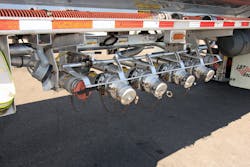GAO finds no justification for PHMSA wetlines ban
Data gathered by the Pipeline and Hazardous Materials Safety Administration simply does not support a ban on cargo tank wetlines. The data collected by the agency was too flawed with inaccuracies to reliably identify wetlines risks.
These were among the key conclusions in the much anticipated wetlines report issues September 11 by the Government Accountability Office (GAO). The wetlines study was mandated by Congress under the Moving Ahead for Progress in the 21st Century Act (MAP-21) legislation in July, 2012.
The GAO found that the PHMSA incident data cannot be used to reliably identify risks from incidents involving collisions with wetlines under tank trailers. Further, the report indicates that incidents used in the rationalization of the proposed rule (HM-213D) were not specifically identified within PHMSA’s database and that the data itself also contained inaccuracies.
“I am extremely pleased with GAO’s findings given its significance to the tank truck industry,” says Daniel R Furth, president of the National Tank Truck Carriers. “As we have mentioned repeatedly, the GAO approached its task in a very professional, thorough manner which led to the same conclusion that we have argued now three times since 1990. Based on this study, I now urge PHMSA to withdraw HM-213D and allow the carrier and enforcement communities to collectively focus their talents and resources on legitimate safety concerns.
“While today’s political environment can be a bit disheartening, today’s finding serves to restore one’s faith in the process, and I’d like to extend our gratitude to the bipartisan leadership of the House Transportation & Infrastructure Committee--specifically Chairman Bill Shuster (R-PA) and Congresswoman Corrine Brown (D-FL)--who had the inclination to listen to our carriers and dig into the substance of our arguments. I’d also like to thank our partners in the association community that worked diligently on this issue, including the American Trucking Associations (ATA), the American Petroleum Institute (API), the Petroleum Marketers Association of America (PMAA), and the Truck Trailer Manufacturers Association (TTMA). Finally, let me add that we look forward to working with the professionals at PHMSA as we have on so many other issues to improve data integrity and enforce the culture of safety that our industry requires.”
Specific GAO findings within its review included the following: (1) GAO could not accurately reproduce PHMSA’s analysis regarding which incidents were true wetlines incidents and which were not; (2) PHMSA’s cost-benefit analysis inaccurately portrayed to consequences of wetlines incidents; and (3) accordingly, PHMSA’s analysis may not accurately represent the costs and benefits of the proposed rule.
In the study released September 11, the GAO recommends that PHMSA improve its data collection processes to remove uncertainty in its reporting. GAO then recommends that PHMSA base any future wetlines rulemaking on the results of this improved data.
Additionally, the report recommends changes to the hazardous materials release reporting process. Specifically, it suggests that PHMSA modify its Form 5800 reporting process to explicitly track whether or not a hazmat release was the result of a wetlines breach.
